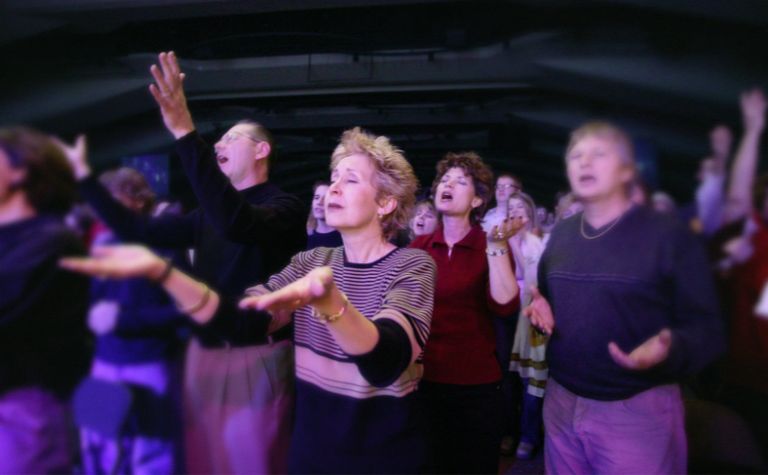The Pentecostal tradition is a dynamic, vibrant segment of Christianity renowned for its passionate worship and emphasis on direct, personal experience with God. Because of the tradition’s size and influence, many people want to know more about what Pentecostals believe and why.
Pentecostals emphasize baptism in the Holy Spirit as a distinct experience, evidenced by speaking in tongues. They believe in divine healing and anticipate Christ’s imminent return. Worship is experiential, marked by exuberant praise, preaching, and expectation of the Holy Spirit’s active presence.
What does baptism in the Holy Spirit mean? How is the Pentecostal view of speaking in tongues different than other Christian traditions? What exactly is divine healing, and why is the doctrine important? How is Pentecostal worship unique? Keep reading to learn the answers to these questions and others.
Also, compare Pentecostalism with other churches on the Christian Denominations Comparison Chart.

Pentecostals Emphasize the Baptism in the Holy Spirit
Pentecostals believe in a distinct experience called baptism in the Holy Spirit, which empowers believers for service and is often evidenced by speaking in tongues.
The opposite of the Pentecostal view of baptism in the Holy Spirit can be seen in traditions that view the baptism of the Holy Spirit as synonymous with conversion or regeneration. Here is a comparison:
| Pentecostal View | Non-Pentecostal View | |
|---|---|---|
| Baptism in the Holy Spirit | Seen as a separate and distinct experience from conversion, often accompanied by speaking in tongues as initial physical evidence. It empowers believers for service and deepens their relationship with God. | Baptism in the Holy Spirit occurs at the time of conversion or regeneration. It is not a separate event but happens when a person believes in Christ and is indwelt by the Holy Spirit. |
| Evidence | Speaking in tongues is often seen as the initial physical evidence of being baptized in the Holy Spirit. | The evidence of being baptized in the Holy Spirit is seen in the transformed life of a believer, characterized by the fruits of the Spirit, not miraculous signs. |
| Purpose | The purpose is to empower believers to serve, witness, and live a holy life. It’s associated with a deeper experience of God’s presence. | The purpose is to regenerate the believer, making them a new creation in Christ, and to indwell and seal them for the day of redemption. |
Pentecostals Value Speaking in Tongues
This is seen as a spiritual gift given by the Holy Spirit and can be a personal prayer language or a language unknown to the speaker used for prophecy.
The opposite of the Pentecostal view on speaking in tongues is cessationism, which holds that the miraculous gifts of the Spirit, like speaking in tongues, ceased with the apostolic age. Here’s a comparison:
| Pentecostal View | Cessationist View | |
|---|---|---|
| Speaking in Tongues | Considered an active spiritual gift provided by the Holy Spirit. It may manifest as a personal prayer language or as a prophetic message that, if given in public, should be interpreted. | The gift of speaking in tongues was specific to the apostolic age as a sign to confirm the apostles’ message. It ceased after the first century and does not function today. |
| Evidence of the Holy Spirit | Speaking in tongues is often seen as initial physical evidence of the baptism in the Holy Spirit, a distinct experience from conversion. | All believers are indwelt by the Holy Spirit at conversion. Evidence of the Spirit’s presence is seen in the fruits of the Spirit and transformed lives, not miraculous gifts. |
| Role in Worship | Speaking in tongues may play a significant role in worship services, both as personal prayer and, when accompanied by interpretation, as a means of edification for the congregation. | Speaking in tongues does not occur in worship services. Worship is more focused on teaching, prayer, and singing hymns and spiritual songs in a known language. |
Also, compare Pentecostalism with Baptists to learn more.

Divine Healing
Pentecostals believe that divine healing is provided in Christ’s atonement and is available to all believers. They frequently practice prayers for healing.
The opposite of the Pentecostal view of divine healing can be seen in traditions that either do not emphasize healing as a present-day guarantee or view it as a phenomenon that generally ceased with the apostolic age. Here’s a comparison:
| Pentecostal View | Non-Pentecostal View | |
|---|---|---|
| Divine Healing | Believed to be an active promise and provision through Christ’s atonement and available for all believers today. Faith, prayer, and anointing with oil are often involved. | While God is capable of healing, it is not seen as a guarantee for all believers today. God may choose to heal but also works through suffering and does not always remove it. |
| Role in Worship | Prayers for healing and testimonies of divine healing often feature prominently in worship services. | Prayers for healing can be a part of worship services, but there is less emphasis on miraculous healing. Other aspects of worship, like preaching, teaching, and sacraments, typically play a larger role. |
| Perspective on Medical Treatment | Pentecostals usually see no conflict between faith in divine healing and seeking medical treatment. Both are seen as means that God can use to heal. | Medical treatment is generally seen as the primary means of addressing illness. Divine healing is seen as rare, and the focus is more often on God’s sovereignty and wisdom in all circumstances. |
The Expectation of Christ’s Imminent Return
Pentecostals typically hold a premillennial view of Christ’s return and believe it could happen at any moment.
Premillennialism and Amillennialism are two differing eschatological views concerning the nature and timing of Christ’s Second Coming and the millennium mentioned in Revelation 20. Here’s a comparison:
| Premillennialism | Amillennialism | |
|---|---|---|
| Second Coming of Christ | Christ will return before the millennium, a literal 1000-year period, and will reign physically on earth during this time. | Christ’s return will occur after the “millennium,” which is seen as a symbolic time, not a literal 1000 years. His reign is happening now in the hearts of believers and in heaven. |
| Millennium | A future literal 1000-year period of peace and righteousness on earth, with Christ physically present and reigning. | The millennium is symbolic, representing the current church age. Christ’s reign is spiritual and is exercised in heaven and through the church. |
| Resurrection and Judgment | There are two resurrections: one of believers before the millennium and one of unbelievers after the millennium. The final judgment happens after the millennium. | There is one general resurrection of all the dead, both believers and unbelievers, at the end of the current age, followed by a final judgment. |
| Nature of Christ’s Reign | Christ’s reign will be physical and earthly during the millennium, with restored Israel playing a prominent role. | Christ’s reign is spiritual and heavenly during the current church age. The church has inherited the promises made to Israel. |
Also, compare Pentecostalism vs. Roman Catholicism to learn more.

Pentecostals Emphasize Experiential Worship
Pentecostals emphasize a direct personal experience of God through baptism in the Holy Spirit, which can lead to expressive worship involving physical responses such as clapping, shouting, and dancing.
The opposite of the Pentecostal view of worship could be a more liturgical or formal tradition like that found in some high church traditions. Here’s a comparison:
| Pentecostal View | High Church View | |
|---|---|---|
| Style of Worship | Typically spontaneous, expressive, and emotional. It may involve physical responses like clapping, shouting, and dancing. Emphasizes direct personal experience with God. | Typically more structured, formal, and follows a set liturgy. There’s a greater emphasis on the sacraments, scripted prayers, and formal liturgical actions. |
| Role of the Spirit | Belief in the active, dynamic presence of the Holy Spirit. The Spirit is expected to guide the service and may inspire spontaneous acts of worship. | The Holy Spirit is believed to work through the elements of the liturgy and sacraments. The emphasis is on God’s promises associated with the means of grace rather than on spontaneous experiences. |
| Role of Preaching | Preaching is often passionate and interactive, with an emphasis on practical application. The preacher is expected to be led by the Holy Spirit. | Preaching follows a prescribed lectionary and often focuses on theological interpretation and instruction. There’s a balance between the roles of the Spirit and the importance of theological training for preachers. |
| Role of the Congregation | The congregation actively participates in worship, and spontaneous responses are common. | The congregation follows the lead of the clergy in the liturgy. Participation tends to be more scripted and less spontaneous. |
Also, compare Pentecostalism vs. Charismatic to learn more.
Related Questions
Catholic vs. Protestant vs. Orthodox: What's the Difference?
Roman Catholicism, Protestant Christianity, and the Eastern Orthodox Church are the three historical branches of the Christian religion. Each tradition traces its doctrines and practices to the New...
The Pentecostal and Baptist traditions are two of the most prominent branches of Protestant Christianity. They have many beliefs and practices in common and have more similarities than differences....
